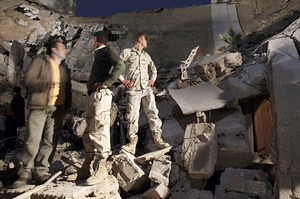
Libyan building destroyed by imperialist bombs dropped on this North African state. The western states have targeted the oil-rich nation for regime change. a photo by Pan-African News Wire File Photos on Flickr.
latimes.com/news/nationworld/world/la-fg-us-libya-20110322,0,7678106.story
latimes.com
Obama faces growing criticism for Libya campaign
Some U.S. lawmakers complain that President Obama failed to consult Congress before launching military action. The Arab League and Russia also criticize the U.S.-led airstrikes.
By Paul Richter and Christi Parsons, Los Angeles Times
6:48 PM PDT, March 21, 2011
Reporting from Washington
President Obama is facing growing criticism at home and abroad over whether the military campaign in Libya is the wrong policy — or the right policy at the wrong time.
Obama, on a five-day tour of Latin America, defended his administration's muscular approach in Libya, saying it was "very easy to square our military actions and our stated policies."
Speaking in Chile, Obama said U.S. military forces would focus on the goal approved by the U.N. Security Council last week, preventing longtime leader Moammar Kadafi's army from attacking Libyan civilians. But he also reiterated that Kadafi should be removed.
He said the United States also would use nonmilitary means, including economic sanctions and an arms embargo, to try to end Kadafi's four-decade rule.
Obama sent a letter to congressional leaders Monday attempting to assure them that the administration was seeking a "rapid but responsible transition" of military command to other members of the United Nations-backed coalition. The letter followed complaints that he had failed to consult Congress before launching military action.
Political analysts say Obama could benefit if Kadafi is quickly ousted, or if there is another quick and relatively bloodless resolution. But if the conflict becomes a stalemate, criticism is likely to mount.
Complaints have already started to escalate. Some early advocates of military intervention, including Sen. John McCain (R-Ariz.), said Obama may have waited too long to help the opposition in Libya.
A contingent of liberal Democrats, normally allied with the president, condemned the use of military force. Some conservatives, as well as foreign policy experts, said Libya is not a vital U.S. interest.
An antiwar group announced plans for protests in Los Angeles, Chicago and nine other cities this week.
"The president seems to have angered almost every major group: He's either done too much or too little or he's done it too slowly," said James Lindsay, a former official in the Clinton White House who is now with the Council on Foreign Relations. "There's a very real political risk for Barack Obama in all of this."
Among the critics Monday was Sen. Richard G. Lugar (R-Ind.), ranking minority member of the Senate Foreign Relations Committee, a widely respected voice on foreign policy who has often sided with the administration.
"There needs to be a plan about what happens after Kadafi," Lugar said. "Who will be in charge then, and who pays for this all? President Obama, so far, has only expressed vague hopes."
A group of liberal Democrats, including Reps. Jerrold Nadler of New York, Donna Edwards of Maryland, Dennis J. Kucinich of Ohio and Maxine Waters and Barbara Lee of California, issued a statement over the weekend saying they "all strongly raised objections to the constitutionality of the president's actions."
Complaints also came from the Arab League, which initially called for imposing a no-fly zone in Libya, a decision that helped persuade the White House to join the fight. Russia's prime minister, Vladimir Putin, lashed out at Washington for launching what he called "a crusade," saying it justified Russia's military buildup.
Administration officials acknowledged the political risk of involvement in Libya at a time when the U.S. is engaged militarily in Iraq and Afghanistan, and polls indicate that Americans want Obama to focus on the economy. But they say the president's insistence that he won't send ground troops, the involvement of other countries, and the promise to hand off command should help bolster support for Obama.
Robert Danin, a former State Department official who is a Mideast specialist, said he could not imagine how the mission could prove a political winner for Obama.
Americans are likely to worry, he said, that the United States will be stuck with part of the bill for rebuilding Libya. And U.S. officials, he noted, are still unsure whether the anti-Kadafi forces are necessarily pro-America and pro-democracy.
"The politics of this are just bad," Danin said.
paul.richter@latimes.com
christi.parsons@latimes.com
Times staff writers Lisa Mascaro in Washington and Sergei L. Loiko in Moscow contributed to this report.
No comments:
Post a Comment